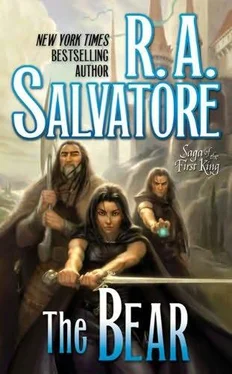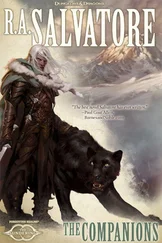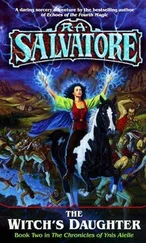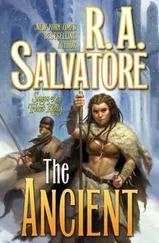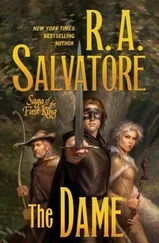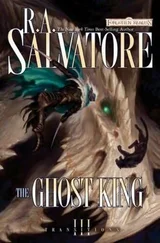R. Salvatore - The Bear
Здесь есть возможность читать онлайн «R. Salvatore - The Bear» весь текст электронной книги совершенно бесплатно (целиком полную версию без сокращений). В некоторых случаях можно слушать аудио, скачать через торрент в формате fb2 и присутствует краткое содержание. Жанр: Фэнтези, на английском языке. Описание произведения, (предисловие) а так же отзывы посетителей доступны на портале библиотеки ЛибКат.
- Название:The Bear
- Автор:
- Жанр:
- Год:неизвестен
- ISBN:нет данных
- Рейтинг книги:3 / 5. Голосов: 1
-
Избранное:Добавить в избранное
- Отзывы:
-
Ваша оценка:
- 60
- 1
- 2
- 3
- 4
- 5
The Bear: краткое содержание, описание и аннотация
Предлагаем к чтению аннотацию, описание, краткое содержание или предисловие (зависит от того, что написал сам автор книги «The Bear»). Если вы не нашли необходимую информацию о книге — напишите в комментариях, мы постараемся отыскать её.
The Bear — читать онлайн бесплатно полную книгу (весь текст) целиком
Ниже представлен текст книги, разбитый по страницам. Система сохранения места последней прочитанной страницы, позволяет с удобством читать онлайн бесплатно книгу «The Bear», без необходимости каждый раз заново искать на чём Вы остановились. Поставьте закладку, и сможете в любой момент перейти на страницу, на которой закончили чтение.
Интервал:
Закладка:
"Does the mind that is still Giavno know anything about the progress in the south?" Pinower meekly asked after a short pause.
Bransen glanced back at the man.
"Dame Gwydre will be out within an hour," Brother Pinower reminded.
Bransen nodded and sat down again beside the dreaming and restless monk.
"No, Bransen!" Brother Pinower scolded. "You came forth in fear. Do not risk your own clarity again in the madness that is Brother Giavno!"
"I know what I will find in there now," Bransen calmly answered, and he flashed a confident smile.
A smile that was a complete facade, for Bransen was truly afraid of entering the swirl of discordant and jarring sensibilities.
But he had to.
SEVENTEEN
They swept down from the high ground, across the grassy banking, crying out for vengeance, waving their weapons, and banging their shields. In the small town before and below them, where every man, woman, and child lay dead or dying, threescore powries adjusted their bloody caps, glowing with fresh blood, and grinned wickedly.
To the side of the rise and the main charge, Prince Milwellis stood in his chariot, expecting this fight to go as had the previous two. His losses would be significant, he expected-perhaps as many as two hundred men-but in the end, the powries would be eliminated.
"There is fear in their eyes," one horseman nearby remarked, and everyone knew he was speaking of the Palmaristown garrison and not the unshakable dwarves.
"Hold steady," Milwellis said to all. "Our footmen will not flee the field." Many nods came back at him, for that was the crux of their strategy this day, as in the previous fights. The footmen, peasants mostly and expendable, would swarm the town, flushing out all of the enemies, and only when their sheer numbers facilitated a powrie retreat would Milwellis and his veteran riders and charioteers sweep in from the sides to claim ultimate and final victory. They had a thousand men descending upon this hamlet; the powries might kill them fifteen to one and still be massacred in the end.
The end, Milwellis was cunning enough to understand and callous enough to accept, was all that mattered.
Sounds of battle joined, of the ring of iron and bronze and the screams of pain and terror and hatred, filled the air. The horses nickered and pawed the ground in nervous anticipation, proper extensions of their riders and drivers, Milwellis knew. No matter how many battles he fought, no matter how many enemies he defeated, this prebattle feeling-the sweat, the churning stomach, the fear-never changed. Milwellis thought of his first fight, a skirmish with a tribe of wild savages across the river from Palmaristown. The river was deeper and calmer on that western bank, more favorable to the larger ships being constructed, and his father had proposed building a second set of docks and a new section of the city over there. Also, the high ground directly across from the current Palmaristown seemed a perfect gateway to the great trees coveted by the shipbuilders and the open and fertile lands that could make Palmaristown the first city of Honce instead of the second.
A very young Milwellis had led that expedition, though in truth, the prince now had to admit to himself, he had been no more than a figurehead and, perhaps, the entire mission had been designed simply to enhance Milwellis's standing in the city proper. The "battle" on that day really wasn't much of a fight, and not a man was killed on either side before the savages had fled into the forest, but Milwellis keenly remembered his fear and the sweat. He had thought those a sure sign of his cowardice and failure, but to his surprise, his father had assured him that any man who did not experience that discomfort before a fight wasn't as brave as he was stupid.
An especially piercing shriek rent the air and pulled the prince out of his contemplation, and he chuckled quietly, for he seemed to mentally replay that first fight before every impending battle.
"Powries out to the west," the spotter in the trees above informed them. "They're breaking."
"And sails?" Milwellis called up to him.
"North," the man replied. The prince nodded, for the trap was in place.
"Ride with the smell of burning Palmaristown in your noses!" Milwellis called to his men. "Ride with the sight of ruined buildings and murdered children in your eyes! Ride with the blow of the horn of Panlamaris in your ears and know this day that these dwarves we trample under hoof and under wheel will never again spill the blood of our families!"
A great cheer went up, and horses strained against the holds of their disciplined riders and drivers.
"Hold, Milwellis!" came a call from the back. The prince turned to see a soldier rushing toward him, waving his arms frantically. Behind the man, coming at a slower pace, marched Harcourt and some others.
The leading soldier gasped for breath as he verily fell against the side of Milwellis's chariot. "General Harcourt bids you to send forth your legion as planned," he sputtered. "But for you to hold and await his arrival."
"What foolishness is this?" Milwellis countered, and he glanced at the riders around him, all staring incredulously at the disheveled courier. Milwellis was making his reputation as a leader who actually led the way into battle, after all, and such courage had earned him the great respect of his legions. "Stand aside or be run down!"
"No, my laird," the man said, and Milwellis growled and took up his reins as if to proceed, but then held back as the word "laird" registered. He turned a shocked expression at Harcourt's courier.
All around and behind Milwellis, horses began to trot and chariots to roll as General Harcourt, rushing forward as fast as his old legs would carry him, prodded the horsemen and charioteers to begin their charge.
"What did you call me?" Milwellis said to the man, who blanched and seemed as if he was about to faint.
By the time Harcourt reached Milwellis's side, most of the cavalry was away, thundering along their predetermined course to intercept the powrie retreat. Milwellis still stood there, staring at the courier, unblinking, his mouth hanging open.
He was still in that pose and posture when Harcourt finally managed to join him. "Milwellis, my friend, ill news from the north," he said.
"My father?" Milwellis mouthed quietly, still staring at the courier.
"His force was overrun by Dame Gwydre," Harcourt replied. He reached up to put a hand on Milwellis's shoulder, but the prince shrugged him off. "My friend, my laird," Harcourt said, "Laird Panlamaris of Palmaristown is slain."
Milwellis growled and roared and plucked a spear from the bucket of his chariot, and only Harcourt's fast reaction stopped him from throwing it into the courier!
"No!" Milwellis roared. "This cannot be! That damned witch of Vanguard!"
Harcourt motioned for a couple of the men who had accompanied him to hustle the terrified courier away and turned his full attention to the volatile young man. "You are the Laird of Palmaristown now," he said, his voice mostly calm but with a measure of consternation in it. "You cannot behave in such a way. The men must fear you but they must love you as well, or you will not receive their finest efforts."
"They are peasants, and I will do with them as I please."
"These are soldiers, my laird. Not simply peasants. Soldiers who run and ride under your banner into the lines of powries and Ethelbert's traitors. My laird, they loved your father. Their pain at hearing his death will be little less than your own."
Milwellis began to argue, but when he looked at Harcourt he noticed the moisture rimming the old general's eyes. Harcourt had been by Panlamaris's side for decades, for longer than Milwellis had been alive, and never once had the man shown anything but love for Panlamaris.
Читать дальшеИнтервал:
Закладка:
Похожие книги на «The Bear»
Представляем Вашему вниманию похожие книги на «The Bear» списком для выбора. Мы отобрали схожую по названию и смыслу литературу в надежде предоставить читателям больше вариантов отыскать новые, интересные, ещё непрочитанные произведения.
Обсуждение, отзывы о книге «The Bear» и просто собственные мнения читателей. Оставьте ваши комментарии, напишите, что Вы думаете о произведении, его смысле или главных героях. Укажите что конкретно понравилось, а что нет, и почему Вы так считаете.
